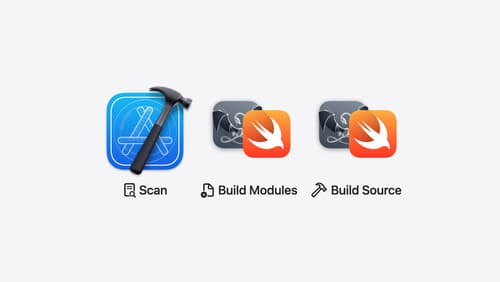Modularization
Asked on 2024-08-02
1 search
Modularization in Swift and Xcode was a significant topic at WWDC 2024, particularly in the sessions "Demystify explicitly built modules" and "A Swift Tour: Explore Swift’s features and design."
Key Points on Modularization:
-
Explicitly Built Modules:
- Overview: Explicitly built modules put the build system in control of module builds, making the process more transparent and efficient. This change allows the build system to avoid redundant tasks and make better scheduling decisions.
- Build Process: The build process is divided into three phases: scanning, building modules, and compiling the original code. This separation helps in creating a module graph and dispatching module compilation tasks efficiently.
- Optimization: By making build settings uniform across the project, you can reduce the number of module variants, which in turn optimizes the build process.
- Benefits: Builds become more reliable and efficient, with precise dependencies and deterministic build graphs. This also means that clean builds now rebuild modules, making the process more predictable and reproducible.
For more details, you can refer to the session Demystify explicitly built modules.
-
Swift Modules and Packages:
- Modules: In Swift, a module is a collection of source files that are always built together. Modules can depend on other modules, forming a dependency graph.
- Packages: A collection of modules can be distributed as a package. Swift Package Manager is the tool used for managing these packages, allowing you to build, test, and run your code.
- Dependencies: Modules in one package can depend on modules in another package, facilitating code reuse and modular design.
For more details, you can refer to the session A Swift Tour: Explore Swift’s features and design.
Relevant Sessions:
These sessions provide a comprehensive understanding of how modularization is handled in Swift and Xcode, focusing on both the theoretical aspects and practical implementations.

A Swift Tour: Explore Swift’s features and design
Learn the essential features and design philosophy of the Swift programming language. We’ll explore how to model data, handle errors, use protocols, write concurrent code, and more while building up a Swift package that has a library, an HTTP server, and a command line client. Whether you’re just beginning your Swift journey or have been with us from the start, this talk will help you get the most out of the language.

Demystify explicitly built modules
Explore how builds are changing in Xcode 16 with explicitly built modules. Discover how modules are used to build your code, how explicitly built modules improve transparency in compilation tasks, and how you can optimize your build by sharing modules across targets.
